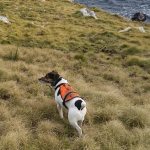

Stoat detecting dog set to work in Orkney

(Orkney Native Wildlife Project)
Macca, a conservation detection dog, is specially trained to detect signs of stoats, and is here in Orkney, all the way from New Zealand, to do just that.
He is the newest member of the Orkney Native Wildlife Project (ONWP) team and, with handler Angela Newport, will systematically search for signs of stoat presence on high-risk islands around Orkney, for the next three months.
They will be at the Orkney Auction Mart’s Glen Orkney Farm, near Kirkwall, from 2–3.30pm and 5–6.30pm this Friday. The ONWP is keen that people come along to find out more, and specifically what will be happening in Orkney.
The events are open to the public, and it’s hoped that Orkney’s landowners will attend. Additional events will be held on the islands that Macca and Angela will be working on.
The ONWP, which is a partnership between Scottish Natural Heritage (SNH) and RSPB Scotland, aims to protect Orkney’s native wildlife by removing stoats, an invasive non-native predator that was first recorded in Orkney in 2010.
Since 2010, stoats have spread and established across Mainland Orkney, Burray and South Ronaldsay.
There have also been a handful of sightings reported on other islands including Hoy and, most recently, Shapinsay. Traps and motion-activated cameras have been used to try to determine whether stoats are present on these other islands following possible sightings. However, the presence or absence of stoats on all “high-risk” islands must be determined before the eradication programme to remove stoats can commence.
Stoats are notoriously difficult to detect particularly when they are at low densities. Therefore, the only way to be certain that stoats are not present is to use specially-trained dogs to systematically search for signs and scent of stoats.
Plans are in place to train six dogs as part of the main project, but, as they take years of training, Macca has been brought in from New Zealand to help confirm the presence or absence of stoats on islands that are at high-risk from stoat invasion due to their proximity to Mainland Orkney.
High-risk islands are those that are within a swimmable distance of islands where stoats are established. Stoats can swim considerable distances (at least 3 km) over open water.